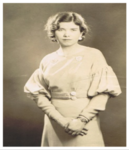Background
the Aggarwal-Blackburn Visiting Scholars program
 Pushpa V. Aggarwal was born in 1924 in Jagraon, Punjab, India, to a father who was a school principal. She was a college graduate and taught at a junior college in Punjab at a time when education for women was socially discouraged and very rare. Pushpa was both curious and open-minded and loved going to the movies. She believed in enjoying life and was kind, charitable and generous; she taught her children to be the same. Even with limited means, she and her husband sent all five of their children to private schools and to college, with her daughter graduating from a prestigious medical university and all four of her sons graduating as engineers, two of them from the Indian Institute of Technology. She loved to travel and to talk to people from far away. With her husband, she took her family for annual vacation travels while the kids were growing up. She was eager to learn about other countries and loved to talk to people from far away and from other countries. Later in life she was able to travel to other countries including the U.S.
Pushpa V. Aggarwal was born in 1924 in Jagraon, Punjab, India, to a father who was a school principal. She was a college graduate and taught at a junior college in Punjab at a time when education for women was socially discouraged and very rare. Pushpa was both curious and open-minded and loved going to the movies. She believed in enjoying life and was kind, charitable and generous; she taught her children to be the same. Even with limited means, she and her husband sent all five of their children to private schools and to college, with her daughter graduating from a prestigious medical university and all four of her sons graduating as engineers, two of them from the Indian Institute of Technology. She loved to travel and to talk to people from far away. With her husband, she took her family for annual vacation travels while the kids were growing up. She was eager to learn about other countries and loved to talk to people from far away and from other countries. Later in life she was able to travel to other countries including the U.S.

Minta L. Blackburn was born in 1910 and grew up on rural farms in central Ohio. She graduated from Newark High School and eventually settled in the Canton/Massillon area. She and her husband worked hard to be able to put their three daughters through college. Though she, her husband and daughters travelled all over the U.S., she did not have the opportunities to travel beyond America. Nevertheless, she often dreamed of going to far-off places. She surrounded herself with travel magazines and books and she would rent and enjoy travel films from the library. Her favorite song was “Far Away Places,” composed in 1948 with the lyrics “those far-away places I’ve been readin’ about and burnin’ to see are callin’, callin’ me.” With her loving heart she would have been delighted to think that, even if only in some small way, she could help others to fulfill their travel dreams and reach goals of furthering cross-cultural understanding.
